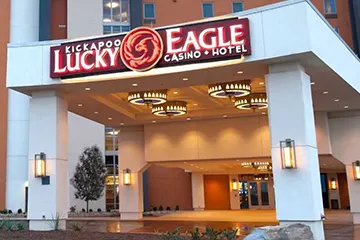 A bill seeking to expand gambling in Texas gains momentum but also raises concerns among Native American tribal leaders who operate the state’s largest casino about the impact Vegas-style resorts could have on their gambling establishment. The Kickapoo Traditional Tribe of Texas expects a significant revenue decline when new glitzy resorts open doors in the state. As a result, many people will face the potential of losing their jobs.
A bill seeking to expand gambling in Texas gains momentum but also raises concerns among Native American tribal leaders who operate the state’s largest casino about the impact Vegas-style resorts could have on their gambling establishment. The Kickapoo Traditional Tribe of Texas expects a significant revenue decline when new glitzy resorts open doors in the state. As a result, many people will face the potential of losing their jobs.
Kickapoo’s Lucky Eagle Casino Cannot Compete with Vegas-Style Resorts Run by Industry Behemoths
Lucky Eagle Casino Hotel, owned and operated by the Kickapoo Traditional Tribe of Texas, is the largest gambling establishment in Texas. Established in 1996 by the Kickapoos under a federal law that gives exclusive gaming rights to Native American Tribes, Lucky Eagle Casino helped the tribe cope with abject poverty and provide jobs for many community members. Today, the gambling venue still generates the most revenue for the tribe and attracts hundreds of thousands of visitors as it is the only legal casino in the state.
There are three federally recognized tribes in Texas, but the Kickapoos have managed to slip away from the state’s anti-gambling laws, under which the Alabama-Coushatta in East Texas and the Tigua in El Paso were forced to shut down their gambling facilities.
But as state lawmakers consider expanding gambling options in Texas, the Kickapoos are worried that they will not be able to compete with industry giants such as Las Vegas Sands and Caesars, which are eyeing the opportunity to establish Vegas-style resorts in the Lone Star State.
Facing the prospect of having to compete with such flashy casino resorts, Kickapoo tribal leaders said that their gambling establishment would lose most of its customers, hit their casino revenue, and may even lead to bankruptcy.
Most of Lucky Eagle Casino’s Customers are Residents of San Antonio
Over the years, the Kickapoos have invested heavily in the development of their casino, and now it boasts a 200-seat bingo hall, over 3,000 electronic gaming machines, a dozen of table games, and a 249-room hotel. San Antonio residents make up 75% of Lucky Eagle Casino’s customers.
The Kickapoos are worried that most of their Alamo City traffic would significantly decline under the proposed bill that would allow eight resorts to be established in Texas’ major urban centers, including one in the San Antonio metro area. They explained that San Antonio residents would stop visiting Lucky Eagle Casino as there would be another gambling venue closer to them.
That is why the tribe is now trying to convince legislators to allow the Kickapoos to run their own destination resort around the San Antonio area. But the tribe’s attempts have so far been unsuccessful. Kickapoo Tribe Chairman Juan Garza said that it is sad that the state does not take into account the needs of the tribe and will allow big corporations to manage casino resorts in the state.